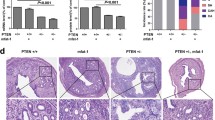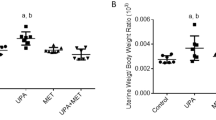Abstract
Objective
Fatty acid synthase (FAS) is a key lipogenic enzyme that is highly expressed in endometrial cancer. Orlistat is a weight loss medication that has been shown to be a potent inhibitor of FAS. The goal of this study was to evaluate the anti-tumorigenic potential of orlistat in endometrial cancer cell lines.
Methods
The endometrial cancer cell lines ECC-1 and KLE were used. Cell proliferation was assessed by MTT assay after treatment with orlistat. Cell cycle progression was evaluated by Cellometer and apoptosis was assessed using the Annexin V assay. Reactive oxygen species (ROS) was measured using the DCFH-DA assay. Western immunoblotting was performed to determine changes in FAS, cellular stress, cell cycle progression, and the AMPK/mTOR pathways.
Results
Orlistat inhibited cell proliferation by 61 % in ECC-1 cells and 57 % in KLE cells at a dose of 500 μM. Treatment with orlistat at this concentration resulted in G1 arrest (p < 0.05) but did not affect apoptosis. Orlistat increased ROS and induced the expression of BIP (1.28-fold in ECC-1 compared to control, p < 0.05; 1.92-fold in KLE, p < 0.05) and PERK (2.25-fold in ECC-1, 1.4-fold in KLE, p < 0.05). Western immunoblot analysis demonstrated that orlistat decreased expression of important proteins in fatty acid metabolism including FAS (67 % in ECC-1, 15 % in KLE), acetyl-CoA carboxylase (40 % in ECC-1, 35 % in KLE), and carnitine palmitoyltransferase 1A (CPT1A) (65 % in ECC-1, 25 % in KLE) in a dose-dependent manner. In addition, orlistat at a dose of 500 μM increased expression of phosphorylated-AMPK (1.9-fold in ECC-1, p < 0.01; 1.5-fold in KLE, p < 0.05) and decreased expression of phosphorylated-Akt (25 % in ECC-1, p < 0.05; 37 % in KLE, p < 0.05) and phosphorylated-S6 (68 % in ECC-1, 56 % in KLE).
Conclusions
Orlistat inhibits cell growth in endometrial cancer cell lines through inhibition of fatty acid metabolism, induction of cell cycle G1 arrest, activation of AMPK and inhibition of the mTOR pathway. Given that patients with endometrial cancer have high rates of obesity, orlistat should be further investigated as a novel strategy for endometrial cancer treatment.






Similar content being viewed by others
References
Siegel RL, Miller KD, Jemal A. Cancer statistics, 2015. CA Cancer J Clin. 2015;65(1):5–29.
Renehan AG et al. Body-mass index and incidence of cancer: a systematic review and meta-analysis of prospective observational studies. Lancet. 2008;371(9612):569–78.
von Gruenigen VE et al. The impact of obesity and age on quality of life in gynecologic surgery. Am J Obstet Gynecol. 2005;193(4):1369–75.
Felix AS et al. Factors associated with Type I and Type II endometrial cancer. Cancer Causes Control. 2010;21(11):1851–6.
Calle EE et al. Overweight, obesity, and mortality from cancer in a prospectively studied cohort of U.S. adults. N Engl J Med. 2003;348(17):1625–38.
Heck AM, Yanovski JA, Calis KA. Orlistat, a new lipase inhibitor for the management of obesity. Pharmacotherapy. 2000;20(3):270–9.
Fako VE, Zhang JT, Liu JY. Mechanism of Orlistat Hydrolysis by the Thioesterase of Human Fatty Acid Synthase. ACS Catal. 2014;4(10):3444–53.
Baron A et al. Fatty acid synthase: a metabolic oncogene in prostate cancer? J Cell Biochem. 2004;91(1):47–53.
Liu H et al. Biochemistry, molecular biology, and pharmacology of fatty acid synthase, an emerging therapeutic target and diagnosis/prognosis marker. Int J Biochem Mol Biol. 2010;1(1):69–89.
Flavin R et al. Fatty acid synthase as a potential therapeutic target in cancer. Future Oncol. 2010;6(4):551–62.
Tsuji T et al. Fatty acid synthase expression and clinicopathological findings in endometrial cancer. Acta Obstet Gynecol Scand. 2004;83(6):586–90.
Rahman MT et al. Fatty acid synthase is a potential therapeutic target in estrogen receptor-/progesterone receptor-positive endometrioid endometrial cancer. Oncology. 2013;84(3):166–73.
Lupu R, Menendez JA. Targeting fatty acid synthase in breast and endometrial cancer: An alternative to selective estrogen receptor modulators? Endocrinology. 2006;147(9):4056–66.
Menendez JA et al. Inhibition of tumor-associated fatty acid synthase activity antagonizes estradiol- and tamoxifen-induced agonist transactivation of estrogen receptor (ER) in human endometrial adenocarcinoma cells. Oncogene. 2004;23(28):4945–58.
Yoshii Y et al. Fatty acid synthase is a key target in multiple essential tumor functions of prostate cancer: uptake of radiolabeled acetate as a predictor of the targeted therapy outcome. PLoS ONE. 2013;8(5), e64570.
Kridel SJ et al. Orlistat is a novel inhibitor of fatty acid synthase with antitumor activity. Cancer Res. 2004;64(6):2070–5.
Malvi P et al. Obesity induced rapid melanoma progression is reversed by orlistat treatment and dietary intervention: Role of adipokines. Mol Oncol. 2015;9(3):689–703.
Carvalho MA et al. Fatty acid synthase inhibition with Orlistat promotes apoptosis and reduces cell growth and lymph node metastasis in a mouse melanoma model. Int J Cancer. 2008;123(11):2557–65.
Menendez JA, Vellon L, Lupu R. Antitumoral actions of the anti-obesity drug orlistat (XenicalTM) in breast cancer cells: blockade of cell cycle progression, promotion of apoptotic cell death and PEA3-mediated transcriptional repression of Her2/neu (erbB-2) oncogene. Ann Oncol. 2005;16(8):1253–67.
Kant S, Kumar A, Singh SM. Tumor growth retardation and chemosensitizing action of fatty acid synthase inhibitor orlistat on T cell lymphoma: implication of reconstituted tumor microenvironment and multidrug resistance phenotype. Biochim Biophys Acta. 2014;1840(1):294–302.
Kant S, Kumar A, Singh SM. Fatty acid synthase inhibitor orlistat induces apoptosis in T cell lymphoma: role of cell survival regulatory molecules. Biochim Biophys Acta. 2012;1820(11):1764–73.
Fujiwara J et al. The anti-obesity drug orlistat promotes sensitivity to TRAIL by two different pathways in hormone-refractory prostate cancer cells. Int J Oncol. 2012;40(5):1483–91.
Olsen AM et al. Fatty acid synthesis is a therapeutic target in human liposarcoma. Int J Oncol. 2010;36(5):1309–14.
Schlaepfer IR et al. Lipid catabolism via CPT1 as a therapeutic target for prostate cancer. Mol Cancer Ther. 2014;13(10):2361–71.
Hadad SM, Fleming S, Thompson AM. Targeting AMPK: a new therapeutic opportunity in breast cancer. Crit Rev Oncol Hematol. 2008;67(1):1–7.
Moschetta M et al. Therapeutic targeting of the mTOR-signalling pathway in cancer: benefits and limitations. Br J Pharmacol. 2014;171(16):3801–13.
Chuang HY, Chang YF, Hwang JJ. Antitumor effect of orlistat, a fatty acid synthase inhibitor, is via activation of caspase-3 on human colorectal carcinoma-bearing animal. Biomed Pharmacother. 2011;65(4):286–92.
Pike LS et al. Inhibition of fatty acid oxidation by etomoxir impairs NADPH production and increases reactive oxygen species resulting in ATP depletion and cell death in human glioblastoma cells. Biochim Biophys Acta. 2011;1807(6):726–34.
Van de Sande T et al. Role of the phosphatidylinositol 3′-kinase/PTEN/Akt kinase pathway in the overexpression of fatty acid synthase in LNCaP prostate cancer cells. Cancer Res. 2002;62(3):642–6.
Yang CS, et al., Fatty acid synthase inhibition engages a novel caspase-2 regulatory mechanism to induce ovarian cancer cell death. Oncogene, 2014.
Zhou G et al. Role of AMP-activated protein kinase in mechanism of metformin action. J Clin Invest. 2001;108(8):1167–74.
Paulmurugan R et al. Folate Receptor-Targeted Polymeric Micellar Nanocarriers for Delivery of Orlistat as a Repurposed Drug against Triple-Negative Breast Cancer. Mol Cancer Ther. 2016;15(2):221–31.
Bhargava-Shah A et al. Orlistat and antisense-miRNA-loaded PLGA-PEG nanoparticles for enhanced triple negative breast cancer therapy. Nanomedicine (Lond). 2016;11(3):235–47.
Author information
Authors and Affiliations
Corresponding authors
Ethics declarations
We certify that the manuscript represents valid work and has not been previously published or being considered for publication elsewhere. All authors have met authorship criteria. This work was generously supported by NIH/NCI 1K23CA143154-01A1 and the Steelman Fund.
Conflict of Interest
The authors, Weiya Z. Wysham, Dario R. Roque, Jianjun Han, Lu Zhang, Hui Guo, Paola A. Gehrig, Chunxiao Zhou, Victoria L. Bae-Jump, have no conflicts of interest to disclose.
Rights and permissions
About this article
Cite this article
Wysham, W.Z., Roque, D.R., Han, J. et al. Effects of Fatty Acid Synthase Inhibition by Orlistat on Proliferation of Endometrial Cancer Cell Lines. Targ Oncol 11, 763–769 (2016). https://doi.org/10.1007/s11523-016-0442-9
Published:
Issue Date:
DOI: https://doi.org/10.1007/s11523-016-0442-9




